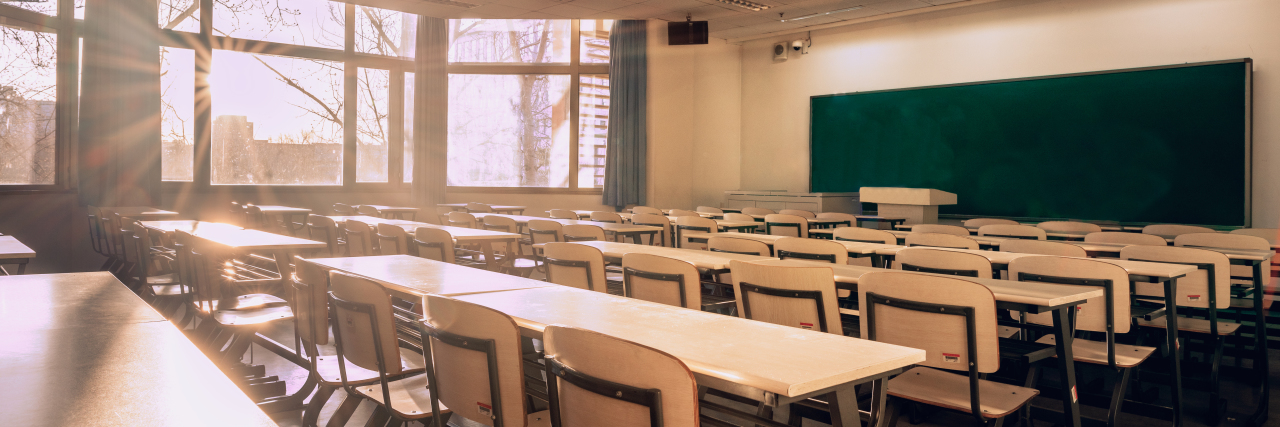Thanks to the internet, I network with parents across the U.S. and in other countries. Recently a story came to my attention. A young student was possibly abused at their school. The parent was notified by the school. Details are still emerging, but the horror remains. Being removed from this situation, I still could not help but cry, because as a parent I think, for the grace of God, that could have been my child. Especially when your child has expressive language and communication delays. I know, because my daughter has Down syndrome, and though she is excelling academically and is very happy, she does have language delays.
My friend Michelle Tetschner recently wrote a piece titled “We Need to Talk About the Abuse of Children With Disabilities in School.” It is a wonderfully written and heartfelt piece that all should read. I am writing this because there is more to say.
Paraprofessionals are often the unsung heroes in our schools. They work tirelessly for the lowest pay. And when a good one is found, they should be respected, celebrated and rewarded. But in our broken educational system, there are too many reasons bad ones are in our schools, including poor pay, little to no training, school systems/cultures that refuse to give them respect, and constant turnover.
I looked for data on turnover and could not find any, though there is a large amount of data concerning teacher turnover. This sadly reflects the lack of respect the position is given. However, parents and teaching professionals see and know the high turnover rate in this position is real. Low pay, no training and lack of respect do not foster goodwill with employees.
What can we do as a society?
I believe the quickest fixes are:
1) First and foremost, all children should start out fully included in general education classes from pre-school on.
This should not be the “earned” placement it often is today — it should be the starting point. Districts that truly practice real inclusion know this, and by doing so have eliminated placements in outside private schools and separate “special schools,” and have very few placements in self-contained classes.
There are many people who say and think their special education teacher in their child’s self-contained class “would never abuse a child.” While that is usually the case, it is not always the case. I personally know of situations that even paid advocates were unaware of. Even good teachers miss school for illness and other reasons. What about their substitutes? And their paraprofessionals? In the isolated incidences of abuse in these situations, the self-contained setting is a prison for the students involved.
2) Being more selective when hiring all educational staff and their substitutes.
The average paraprofessional pay is $13.34 per hour (based on data from Indeed). In 2019 the “living wage” most often mentioned as a starting point is $15.00 an hour. These vital professionals are often making less than that. Many of them have to work second and third jobs. It can seem as if people are being hired off the street, with few qualifications, because that is, in fact, the case.
3) Training and continuing education for all educational staff, including paraprofessionals.
Paraprofessionals are often given no training. When they are given any, it is usually very bare bones. They are not treated as educational professionals when it comes to continuing education by our school systems, but they are just as “liable” and important in our children’s educations. They are often not part of planning meetings, team meetings, continuing education, or paid for professional development days.
4) Leadership from the top down should focus on changing the culture around all educational professionals to encourage team building and respect.
Paraprofessionals are often treated as if they are at the bottom of the ladder, instead of as integral team members. I have seen good ones treated as “less than,” and bad ones remaining and being transferred from building to building. This is a national problem that is usually swept under the rug by special ed directors, superintendents and school boards for “budget reasons.”
5) Mandating clear policies in every district for all paraprofessionals.
This should include job descriptions, classifications, clear hiring and placement guidelines, and individual placements with students’ needs being the first concern. Special education systems often refuse to categorize paraprofessionals correctly by need, or even give them real job descriptions. They are often randomly placed in schools or with students.
6) Making sure all building administrators, and staff, are well versed in how to handle an abusive situation.
The story I mentioned at the beginning was very sad. But there were some positives. The child was fully included, so the incident was seen and stopped immediately. When students are not included, abuse often goes unseen because students with significant disabilities are the most vulnerable and often have poor communication skills. The principal did the right thing by calling the parent, and most likely taking further steps.
7) Mandatory cameras in every self-contained class.
My friend Michelle Tetschner recently wrote a piece on cameras as well.
A longer-term intervention for all education professionals, starting with paraprofessionals, needs to be much higher pay. That requires fixing our broken system. I have lost faith that our government will do this as a whole, though that would be ideal and the most effective method.
Until that magical day comes, our districts, cities, and states need to do this one by one. This great article shows how Maryland is trying to do what Massachusetts did in 1993, and why.
We live in a time when our kids are already at risk of being shot by strangers in our schools and communities, and no one is addressing this. Here is one tragedy we can start addressing now. Our children are our responsibility, and they are at our mercy.
Getty image by Zhang Shu.

